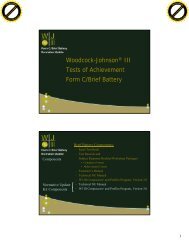[PUBLISH] IN THE UNITED STATES COURT OF APPEALS FOR ...
[PUBLISH] IN THE UNITED STATES COURT OF APPEALS FOR ...
[PUBLISH] IN THE UNITED STATES COURT OF APPEALS FOR ...
You also want an ePaper? Increase the reach of your titles
YUMPU automatically turns print PDFs into web optimized ePapers that Google loves.
1243 (11th Cir. 2000), rejecting claims of ineffective assistance of counsel. Next,<br />
Holladay appealed to this court for permission to file a second habeas petition and<br />
stay of execution, in light of the Supreme Court’s decision in Atkins v. Virginia,<br />
536 U.S. 304, 122 S.Ct. 2242 (2002), which held it unconstitutional to execute the<br />
mentally retarded. We granted Holladay’s request, stating that we were not holding<br />
that Holladay was mentally retarded: “[r]ather we simply hold today that based on<br />
the facts presented and the procedural posture of this case petitioner should be<br />
permitted to file a second petition for a writ of habeas corpus on the basis of his<br />
Atkins claim.” In re: Holladay, 331 F.3d 1169, 1176 (11th Cir. 2003). Holladay<br />
prevailed in that second habeas petition when the district court found that he<br />
proved by a preponderance of the evidence that he was mentally retarded.<br />
Holladay v. Campbell, 463 F.Supp.2d 1324 (N.D. Ala. 2006). Now the State of<br />
Alabama appeals this decision of the district court. 1<br />
1<br />
The district court held that the State of Alabama affirmatively waived exhaustion<br />
of this issue. See 28 U.S.C. §2254(b)(3) (“A State shall not be deemed to have waived the<br />
exhaustion requirement or be estopped from reliance upon the requirement unless the State,<br />
through counsel, expressly waived the requirement.”). The district court also held that<br />
Holladay’s presentation of this issue to the district court was not the subject of any procedural<br />
bar. For these reasons, and because the issue was never litigated in the state courts, the district<br />
court resolved the issue – after evidentiary hearings first before the magistrate judge and then<br />
before the district judge – according no deference to any decision of the state courts. In this<br />
appeal, the State of Alabama asserts no challenge to the district court’s decisions with respect to<br />
exhaustion, procedural bar, holding of evidentiary hearings in federal court, or deference.<br />
Accordingly, any such challenge is deemed abandoned, and we proceed to entertain the merits of<br />
this issue on appeal according no deference to any state court decision on the issue.<br />
2


![[PUBLISH] IN THE UNITED STATES COURT OF APPEALS FOR ...](https://img.yumpu.com/22422353/2/500x640/publish-in-the-united-states-court-of-appeals-for-.jpg)













